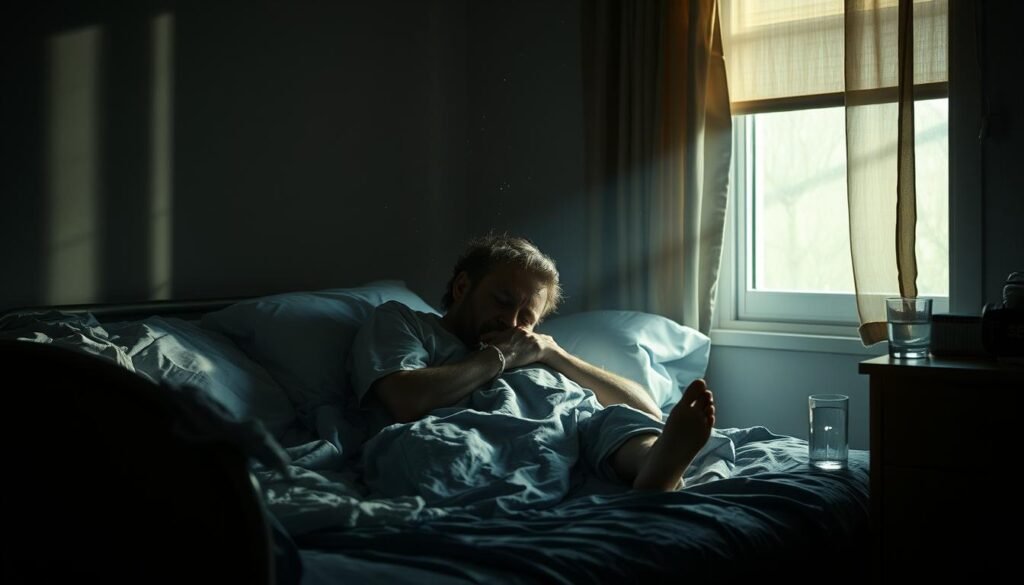About 80% of people getting radiation therapy face short-term side effects. These side effects can really affect their day-to-day life during treatment. Radiation therapy helps fight cancer, but it comes with its own set of problems. Knowing how to manage these side effects is key to making treatment easier.
Side effects usually show up in the second or third week of therapy. They can stick around for weeks after treatment ends. Common side effects are feeling tired, skin issues, losing hair, changes in appetite, issues with the mouth and throat, cough, diarrhea, feeling sick, and throwing up. It’s important for patients to know about these possible side effects. This way, they can get help when they need it. Luckily, most side effects get better a few months after radiation therapy ends. This helps patients get back to their normal life. For more information, visit this resource.
Key Takeaways
- Approximately 80% of patients undergoing radiation experience short-term side effects.
- Common side effects include fatigue, skin reactions, and appetite changes.
- Side effects often start 2-3 weeks after treatment begins.
- Many side effects resolve within 1-2 months post-treatment.
- Effective management strategies are available to help minimize side effects.
- Communication with healthcare teams is vital for addressing concerns.
- Understanding side effects can lead to better overall treatment experiences.
Understanding Radiation Therapy and Its Side Effects
Radiation therapy is key for treating cancer, used by over half of all diagnosed patients. It targets the cancer cells but can also affect nearby healthy tissue. This leads to various radiation therapy side effects. How people react to radiation depends on the cancer type, area affected, the radiation amount, and their health.
Some early radiation therapy side effects are fatigue, hair loss, skin issues, nausea, and diarrhea. These depend on which part of the body is treated. Fatigue means feeling tired all the time, even after resting. Skin can get red, swollen, and dry, like a sunburn. When treatment is for the head and neck, it can cause dry mouth and make eating hard.
It’s important to know the difference between early and late side effects. Early ones show up soon after treatment starts and might last a few weeks. But late effects can happen years later and may harm vital organs. These could lead to serious heart or lung problems and, though rare, a new cancer.
Planning your radiation therapy is key to making it as safe as possible. Doctors aim the therapy carefully to avoid harming healthy cells. They will talk about possible side effects to make sure you’re informed. By understanding radiation therapy side effects, you can better prepare for what lies ahead.
The Importance of Communication with Your Cancer Care Team
Good communication in healthcare is key, especially for those getting radiation therapy. The cancer care team helps patients feel supported and informed. Talking about treatment experiences improves understanding and life quality.
Research shows talking well with your doctor leads to happier patients. This means handling side effects better. Speaking up lets the team fine-tune treatments, easing discomfort and building trust.
Clear communication helps patients understand their treatment and what to expect. Knowing about the effects gives patients control. It’s important to ask about your treatment, what side effects to expect, and your care after treatment.
Open talks help correct any wrong ideas and provide true info about treatments. This encourages following the treatment plan closely. It also lifts spirits and helps emotionally in hard times.
| Key Aspects | Impact |
|---|---|
| Patient Satisfaction | Higher satisfaction correlates with improved quality of life. |
| Prognostic Awareness | Directly influences quality of life and mood. |
| Effective Symptom Management | Reduces side effects and enhances the treatment experience. |
| Patient Engagement | Encourages participation in clinical trials and informed decisions. |

Managing Short-term Side Effects of Radiation
Short-term side effects from radiation therapy can greatly affect a patient’s life. Knowing how to handle these effects is key for patients in treatment. Often, these early side effects start within the first few weeks. The type of radiation and health of the patient influence how bad and long these effects last.
Common Early Side Effects
Many patients report feeling very tired, which is one of the common early side effects of radiation. Where the treatment is given can make this fatigue worse. Some might feel sick or throw up, especially if treated around the head, neck, stomach, or lower body. Skin might get sensitive, peel, or blister. Hair loss or thinning can happen in treated areas with hair. Thankfully, these side effects usually get better a few months after finishing the treatment.
Factors Influencing Side Effects
Many factors influence side effects during radiation. Where on the body the radiation is given changes how severe symptoms are. Those treated for breast or head and neck cancers might see more skin irritation. Prior health issues or stress can also change how one reacts to treatment. About 30 percent of patients still feel tired long after treatments end. It’s very important to manage these side effects well. This helps patients feel better during and after treatment.
Fatigue: A Common Side Effect
Fatigue is a common issue for those getting radiation therapy. Over 80% of people with cancer feel tired during treatment. It can happen before, during, or after therapy. It’s crucial for patients to recognize and talk about their fatigue. Understanding what causes fatigue from radiation helps in managing energy levels.
Recognizing and Reporting Fatigue
The first step is identifying fatigue. Signs include feeling low on energy, tired even after resting, and having trouble focusing. Patients should tell their doctors how tired they feel. They can use a scale to describe their fatigue. Writing down when you feel tired can show patterns and causes. This helps doctors create the right plan to manage it.
Strategies for Managing Fatigue
Managing radiation-related fatigue includes several steps. One helpful activity is light exercise, like walking for 20 minutes each day. This can boost energy and well-being. Also, taking breaks during the day saves energy. Drinking plenty of water and eating balanced meals help fight off fatigue. These steps are key for a better life during and after treatment.

| Strategy | Description |
|---|---|
| Light Exercise | Engaging in brief walks or gentle stretching to boost energy and mood. |
| Rest Periods | Scheduling breaks between activities to recharge and avoid overexertion. |
| Hydration | Drinking plenty of fluids to support overall health and energy levels. |
| Balanced Nutrition | Eating well-rounded meals rich in nutrients to maintain strength and stamina. |
| Fatigue Diary | Tracking fatigue levels and triggers to discuss with healthcare providers. |
Skin Care During Radiotherapy
It’s very important to take care of your skin during radiotherapy. This is because skin problems like redness and sensitivity are common. Knowing about these changes helps patients look after their skin better while being treated.
Understanding Radiation Dermatitis
Radiation dermatitis can cause different levels of skin irritation. This depends on the therapy type and treatment area. Skin issues usually get worse up to two weeks after treatment ends. So, ongoing care is needed for healing. Hair in the treated area might also fall out, but it should grow back in 3 to 6 months.
It’s good to keep an eye on your skin even months after treatment. Some side effects might pop up late.
Skin Care Tips and Recommendations
There are several things patients can do to care for their skin during radiotherapy. Here are some tips:
- Keep your skin moisturized with a gentle, unscented lotion.
- Avoid tight clothes that could irritate the skin.
- Use mild, unscented soaps and stay away from alcohol-based products.
- Stay away from very hot or very cold temperatures.
- If your skin looks unusual or if it hurts more, talk to your doctor.
It’s also important to protect your skin from the sun. Use sunscreen with SPF 50 for a year after your treatment. Stay out of chlorinated pools, especially if your skin is blistering or peeling. By following these tips, you can help manage skin problems during radiotherapy.
Mouth Care During Radiation Treatment
When the head and neck area is treated with radiation, patients often face oral issues. These can include mouth sores, dry mouth, and taste changes. These side effects can make daily life harder and affect a person’s happiness. It’s very important to take care of your mouth during radiation to lessen these problems and keep your mouth healthy.
Oral Side Effects of Radiation Therapy
The oral problems caused by radiation therapy can be quite tough. Mucositis is a common issue. It’s a painful swelling inside the mouth that can last a long time. Radiation can make it last longer than the mucositis from chemo. You might have mouth sores, dry mouth, a metallic taste, or pain.
- Mouth sores
- Dry mouth due to salivary gland damage
- Changes in taste, often described as metallic
- Pain that may impede eating or speaking
Good oral hygiene and dental advice before starting treatment are key. They can make these side effects less severe. Seeing a dentist early can spot and fix problems before radiation begins.
Effective Mouth Care Practices
Good mouth care can make a big difference in comfort during radiation. Try these tips:
- Gentle Brushing: Use a soft toothbrush. Brush at least twice daily to avoid irritation.
- Regular Rinses: A warm saltwater or baking soda rinse can calm irritation and keep the mouth clean.
- Saliva Substitutes: There are products you can buy to help with dry mouth.
- Povidone-Iodine Mouthwash: This alcohol-free mouthwash may help prevent mucositis from starting.
- Icing the Mouth: Ice chips can soothe mucositis symptoms.
Adding these steps to your daily routine can help reduce the pain and discomfort of oral side effects. Always talk with your healthcare team to tailor mouth care to your needs and the side effects you’re facing.
| Oral Side Effects | Duration | Care Practices |
|---|---|---|
| Mucositis | 6-8 weeks | Rinsing, soft brushing |
| Dry Mouth | Variable | Saliva substitutes |
| Taste Changes | Variable | Diet modifications |
| Mouth Sores | Variable | Healing agents, topical painkillers |
Focusing on mouth care during radiation is vital. It can greatly better a patient’s experience by tackling the unpleasant oral side effects well.
Nutritional Support During Radiotherapy
Good nutrition is vital when you’re getting radiotherapy. It speeds up recovery and handles side effects well. Cancer treatments can change how much you want to eat. This makes eating right a big challenge. But, it’s key to eat well to get back your strength and keep up your energy.
Managing Appetite Changes
Changes in how much you feel like eating is common during radiation therapy. You might feel nauseous or not want to eat much. This makes getting the right nutrition hard. Here are a few tips to help:
- Eat small, frequent meals. This helps avoid feeling too full and keeps nutrients coming.
- Drink plenty of liquids. Not drinking enough can make you lose your appetite and feel tired.
- Talk to a nutrition expert. They can give advice that fits your needs and treatment.
Choose foods that are easy on your stomach. Soft or liquid foods can be easier to eat if you have trouble swallowing. Trying these tips can make a big difference in how you feel during treatment.
High-Protein Foods for Recovery
Eating more protein and healthy fats is key during radiation therapy. It helps your body heal and keeps you energized. Here are some foods rich in protein:
- Fatty fish, like salmon, are great. Try to have them two to three times a week.
- Meat, fish, eggs, cheese, and dairy products that are full-fat are good choices.
- Protein shakes, like ENU Nutritional Shake and Kate Farms Standard Shake, are also great.
Adding fruits, veggies, and whole grains gives you extra energy. Foods like avocados, nut butters, and chia seeds add more calories. Eating this way helps a lot with recovery and makes treatment work better.
Nutrition is key in dealing with appetite changes from radiotherapy. Knowing what and how to eat can help you face treatment challenges better.
For more on how radiation therapy fights lung cancer, check out this resource.
Radiation-Induced Nausea and Vomiting
Radiation therapy often causes side effects, such as nausea and vomiting. These reactions can start soon after treatment and may last for weeks. Knowing how to spot and manage these symptoms is key.
Identifying Nausea Triggers
Different things can bring on nausea. Stress, certain smells, and the sight of treatment tools are common triggers. Acute nausea happens within a day of treatment, while delayed nausea takes 1 to 7 days to appear. Previous bad experiences can cause anticipatory nausea before treatment starts.
Keeping a symptoms diary helps find patterns. This diary guides patients to cope better with nausea.
Medications and Natural Remedies
There are many medicines to ease radiation-related nausea. Antiemetics are effective for many. Also, consider natural methods like acupressure and acupuncture. They can support medicines in controlling nausea.
Talking with your healthcare team is important. It ensures you get the best care. For more tips on handling radiation side effects, click this resource.

Emotional Support for Cancer Patients
Emotional support is crucial for cancer patients. It aids them through the tough times of diagnosis and treatment. Cancer challenges physical health and brings emotional stress. This stress can cause anxiety, depression, and feelings of being alone. Knowing the emotional burden is key to managing these emotions.
Coping with Emotional Distress
Patients deal with many emotional hurdles during their cancer journey. Anxiety over treatment and fear of the cancer coming back are common. This anxiety can stay even after treatment ends. A study in the Indian Journal of Palliative Care shows that good emotional support can greatly improve life for cancer patients and their caregivers.
- Support groups offer a place to share feelings and stories.
- Regular routines and physical activity can lessen depression.
- Talking to mental health experts helps patients handle their emotions.
Utilizing Support Groups and Counseling
Support groups connect survivors who share their struggles. This connection eases loneliness. People find comfort in knowing they’re not alone. Counselors provide tailored advice for facing emotional issues. By talking and doing activities they enjoy, patients can feel less stressed.
Treatment may change how patients look and feel about themselves. This can impact relationships and self-esteem. Support groups and counseling offer guidance through these emotional challenges. They help improve resilience. This boosts patients’ confidence as they go through treatment.
| Emotional Challenges | Support Strategies |
|---|---|
| Anxiety about treatment | Joining a support group |
| Fear of recurrence | Counseling and therapy |
| Feelings of isolation | Engaging in community events |
| Changes in self-esteem | Participating in self-help workshops |
Conclusion
Knowing how to handle radiation’s short-term side effects is key to better health for patients. These side effects can be tough. They include skin problems, feeling very tired, and issues in the mouth. Talking openly with doctors and being an active part of the treatment helps a lot.
Doctors and their teams help find the right treatments, like eating well and other therapies. It’s good to know that common problems, like trouble controlling bowel movements or feeling sick, can be managed. Patients should try the ideas shared here and keep up with information on long-term side effects, which might need ongoing care.
Taking care of the immediate side effects of radiation prepares patients for a smoother recovery. Getting to know more about their health lets patients live better during and after treatment. For more tips and information on additional treatments, read this informative article.